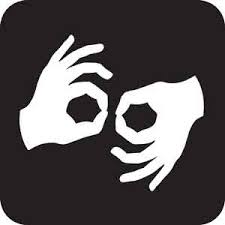How about conducting an entire day's session in Sign language. I was actually visualizing the same for past two-three years and this one-day session got materialized from one of our corporate partners which has hired almost 30 employees with speech and Hearing Impairment. I shifted my career from corporate to development sector in 2016, and exactly after one month, the planning and discussion for these sessions started. The Corporate wanted us to have Communication Boot Camp for these employees as they have limited knowledge in Communication skills. Big thanks to the Corporate for continuously hiring people with speech and hearing impairment
Talking about the Deaf community, I have met so many deaf in last 7 to 8 years. I am even proud to say that I have more deaf friends than hearing(normal) friends. The one thing which is lacking with most of the deaf is their communication skill. The reason being, we hearing people talk and listen and write but for them, they always SIGN, yes, they use sign language to communicate. Now, most of these deaf write the same way, they sign. For example, while signing, they always place WH questions in the last during conversation wherein when it comes to written communication, we place WH questions in first place.
Your name what?
Your home where?
You study what?
You work where?
Most of the time, they won't be using Grammar while communicating in Sign Language, they use only basic words without using proper nouns, verbs, preposition, adverbs, conjunctions etc. Now when they seek employment, their written communication gets tested and they find it difficult to sometimes even pass the written aptitude test. Since we could hear what we speak, we know the differences between pronunciation but for them, it's difficult to even write correct spellings at times.
'You' and 'Yours' mean the same to them. It took me 20 minutes to explain the difference between You and Yours. I took two different mobiles from two participants and then explained to them the difference. So each and every topic consumes time, sometimes you have to do a role play and explain to them which is the most efficient methodology to explain any concept while training.
Another example: Contract and Contact - all means the same. Since we could hear what we speak so we know the difference between these two terms. But for them, they use Contract instead of Contact, the 'r' for them hardly matters but once they know the real meaning then they understand. Same is the case with 'Confidence and Confidential". Since both of these words have similar spelling, they think the meaning to be the same but when I did the role play of Confidential, then they understood the real meaning. This is great learning for me too as I could make out what they think if the spellings are almost similar, we could pronounce and understand the meaning but since they can't pronounce, it becomes difficult for them.
Emotional Literacy
At times, we may have to make them realize that even our English is not that great and we also make many mistakes. Also, in order to correct their mistakes, first I need to understand what is that they wanted to write, I need to think the same way and then it becomes easy for me to write and correct their mistakes. While writing, they also carry the same emotions and expressions but without using proper grammar and punctuations. The onus is on me to find out their emotions and feelings and get the same on the paper. Again while signing they are very polite but they cannot convey the same politeness in written communication. We need to make them understand how the hearing person would perceive their politeness.
Example: You give me leave versus Kindly grant me leave.
For the deaf, "You give me leave" carries the same emotion as we have when we use "Kindly grant me leave". But a hearing person would think the deaf to be rude with this kind of message. So now, I need to teach them how to convey the same politeness by adding few words like Please, Request You, Kindly etc. Though it may time for them to follow, I feel that somewhere they started learning these etiquettes.
I also make sure that every person understands the concept, unlike in other classroom training where the trainer assumes that everyone understands but in my case, I keep asking everyone if they understood the concept. Since the learning abilities and grasping power is different for even hearing people, same is the case with Deaf also. Some deaf understand and some have doubts but they never ask in public thinking about the consequence
Importance of Sign Language
Sign language is one of the beautiful languages which exhibits your creative skills and improves your interpersonal skills too. Imagine, a whole 6-hour session without uttering a single word but almost explaining everything with mere gestures, actions, signs, expressions, role plays etc. I really love doing this and imagine you have to think different methodologies immediately if one doesn't work out. Somehow you have to make them understand, no matter how long it takes. I still remember the day when I was explaining Not Only, But Also - a conjunction used in most of the conversations. It took almost half an hour to explain the context. Most of the deaf, when they encounter a word "No, Not", they always think that tone of the context to be negative so it becomes difficult to break that logic and explain the context. Video-based learning proved very effective and useful. They could register the concept in their mind and becomes easy to recollect.
Also, I am proud to say that today I had picked up most of the signs from my deaf friends either during training or during some interactions whenever we meet. During my training, I pick up almost 10 signs per class and at times I need to unlearn few and learn new signs, Since it's their own language, so at times we need to accept different types of signs and go forward. My signs have become very fast, I have become comfortable in ISL(Indian Sign language) spellings too. At times I need to switch between two signs (American and ISL) whenever I meet deaf with varied Sign language. Though its bit confusing, I take it as a challenge to enhance my skills. Also, my observations skills have improved significantly. During any workshop or training, when you ask a question to the audience (hearing folks), at least you could hear so many answers but in case of deaf participants, you have to observe so many signs coming at one time. Though we need to tell them that they should first raise the hand and then answer but still out of curiosity you get to see many answers at the same time. So my challenge is always to look at each and everyone's sign and their explanation.
There is a saying that if you remain silent for some hours, you get inner peace. Same is true with me too, the silence has given me some good peace and esp during those 6-hour training, though I get tired, I feel so happy at the end of the day which gives me more strength.


Comments
Add Comment